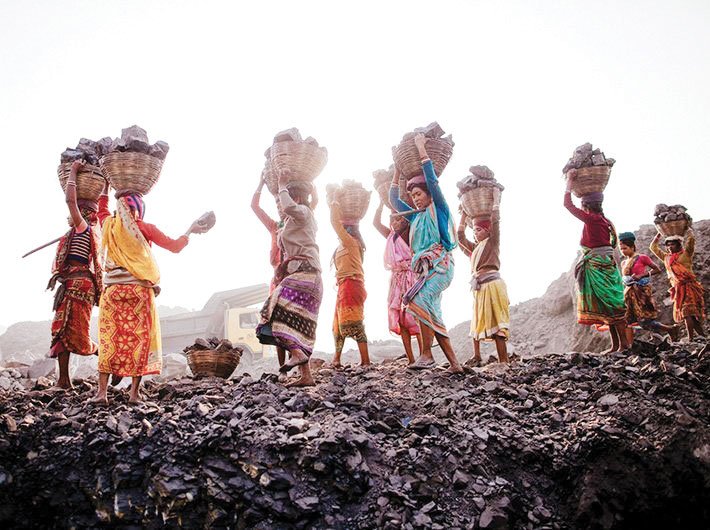NREGA wage delays have so far been compensated by states but the delays caused by centre have never been compensated
It could befit a welfare state to have a law that guarantees work and wages for unemployed citizens. The National Rural Employment Guarantee Act (NREGA), now known as Mahatma Gandhi National Rural Employment Guarantee Act (MGNREGA), was supposed to be just that. It assured 100 days of work in a year to anyone from a village who demanded work. It also promised wages within 15 days of the work week.
And if wages were delayed by even a day more than these 15 days, the worker was to claim compensation for each day of the delay.
There is a case today in the apex court accusing the government of wage delays in thousands of cases this year.
Had there been an assured compensation, would there be delays?
The answer is that the compensation has remained just a promise, which the legislation has not been able to fulfil. In this case then should the Act be amended?
Rajendran Narayanan, independent researcher with the Azim Premji University, and two other researchers recently looked at payment delays and delay compensation in ten states in 2017-18 and their conclusions are quite unsettling.
It shows very clearly that the law is not able to clarify the role of the state and the centre in the payment of compensation whenever there is a delay on their part. While both contribute to the delay, the centre so far has taken no responsibility for paying compensation for its share of delays.
To understand what is happening now, Governance Now looked at a hypothetical situation. Suppose one were working under NREGA from December 1 to December 10. In such a situation there are two kinds of payment possibilities, according to Rajendran Narayanan. These are:
Case 1: The block/panchayat generates the fund transfer order (FTO), which is an electronic invoice sent digitally to the centre to release wages, on December 30.
Let us suppose the centre then releases the wages on January 25.
As things stand, the NREGA management information system (MIS) calculates the delays only till the FTO is generated, i.e., till
December 30.
In this case, it would be assumed that there is a delay of five days, i.e., between December 25 (15 days after work completion) and December 30. This delay is getting registered and reported in Report 14.1 in the NREGA MIS.
However, the delay between December 30 and January 25 (when the centre transfers money to the labourers) is not getting counted as delay anywhere in the system. This is what we refer to as partial delays being captured.
Case 2: For the same work dates, i.e., between December 1 and December 10, suppose the block/panchayat generates the FTO on December 20, i.e, within 15 days of completion of work and suppose the centre releases wages on the January 25.
Then this delay is not getting registered anywhere. Although the centre has taken 35 days between FTO generation and crediting the wages, this delay is not considered as delay at all by the NREGA MIS. This is what we call “No Delays Being Captured”.
Rajendran and his co-researchers sampled 45 lakh transactions in the first two quarters in 2017-18 and nearly half of them, that is 20.25 lakh of them or 45 percent, fell in that category.
The supreme court has been given these findings as an evidence, Rajendran told Governance Now.
The Act mandates that the labourers should get wages within 15 days of completion of work. Hence, the extent of violation is huge and Rajendran says he hopes that the court will give a favourable verdict. “Why should the labourers pay the price for political/bureaucratic delays?” he asks.
Workers have been paid compensation for the delayed wages all these years. But what was being paid whenever it was paid was partial compensation.
According to the study findings of Rajendran and his team, in FY 16-17, the calculated amount on the NREGA MIS for delay compensation was Rs 519 crore of which only about 6% or so was actually paid as delay compensation. However, the true payable amount was Rs 1,200 crore.
So is the problem with the law itself? Should it be amended to put an end to this kind of misinterpretation and exploitation of workers?
Says Rajendran: “I don’t think the Act needs to be changed because it is spelled very clearly in the Act that delay compensation is based on the date on which workers get their wages. What needs to be done is clearer structures of accountability on the central government and banks. When automated reports are possible, why not automatically trigger the fines accrued by each department depending on the time taken by them?
“Also, why can’t the government have an easy-to-read report available that has all the dates corresponding to one transaction in one row so it becomes easy to pin down the accountability structures?”
Another problem is over centralisation of the payment architecture. “Now the workers have no place to ask if their payments are not received once the FTO is generated. The block officials, on many occasions (and rightly so), say that ‘Humne to FTO kar diya hai’ (we have generated the FTO),” says Rajendran.
The petition in the supreme court has been put by the NGO Swaraj Abhiyan led by Prashant Bhushan and Yogendra Yadav who were formerly with the Aam Aadmi Party (AAP).
Yadav told this writer that for the past two and a half months, FTOs have been generated but the government has not been responding to them as it did not have funds.
“As for the compensation, we have a note from the centre acknowledging that it was its job to pay for delays on its part. So that is also with the court. The court has given orders that it would be looking only at these two issues in the next hearing. So there is hope,” says Yadav.
Ankita Agarwal of the NREGA Sangharsh Morcha says the law is straightforward and it was for the centre and states to pay their share of compensation for the delays caused by each side.
She says that it has been implemented in a distorted way by the centre. The compensation itself is just 0.05% of the wage per day of delay, which would be a pittance and may come to just a few rupees per worker. However, it would mean a huge amount when the centre has to shell it out in bulk to thousands of workers. And that could be a good disincentive for the centre to not delay wages.
The ministry of finance has agreed in a note following the Rajendran Narayanan study that delays are calculated only until the FTO is generated at the block/panchayat level. It said that the centre has not been paying for its share of delays and was it to compensate then it would be a huge burden on the exchequer.
The document indicated that the principal reasons for such delays were “infrastructural bottlenecks, (the lack of) availability of funds and lack of administrative compliance”.
While the centre and states play this game of passing the buck on paying compensation, it is the workers who suffer. And NREGA which is supposed to be a blessing for workers, providing them work as a matter of right, turns into a tool for exploitation and denial of the basic labour right to be paid on time for the work done.
According to the Rajendran study, there have been instances of delay as long as 200 days.
Not only are the delays massive, the government’s misrepresentation of the “delay” meant that the workers cannot even be compensated for the full extent of delays.
A call from the supreme court may force the centre to follow the law and compensate workers for the delays caused by it. However, the NREGA Sangharsh Morcha has no such hopes. “Last year when the Swaraj Abhiyan had gone to court asking for work in NREGA for drought-hit states, the court had given six orders which included implementation of Food Security Act and NREGA. But none of these were heeded,” says Agarwal.
Meanwhile, as per the sample analysis by Rajendran and his team of authors, just 32% of wages have been paid on time in the ten states they studied, even though 152 crore person days of work have been generated through the NREGA in 2017-18 so far. The government has claimed that 85% wages have been paid on time, which is a calculation not including the delays caused by the centre.
feedback@governancenow.com
(The article appears in the January 15, 2018 issue)

